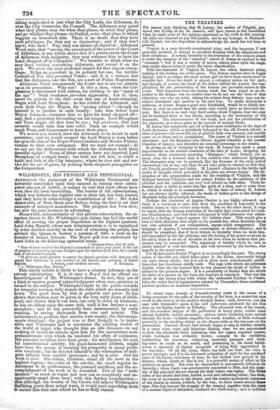THE THEATRES.
WE cannot help thinking that M. Latour, the author of Virginie, pro- duced last Friday at the St.. James's, will have reason to feel dissatisfied when he reads some of the opinions expressed on his work in this country. All alike are disposed to pay full justice, not to say homage, to Mademoi- selle Rachel; but the disposition to acknowledge his merit has not been sO general Virginie is a very cleverly-constracted play; and the language, if not generally poetical, is always in excellent keeping with the characters and their situations. A certain formality in the treatment of the subject places it under the category of the " classical " school of drama as opposed to the "romantic "- but it has a variety of action, taking place upon the stage, that might almost bring it under the latter classification.
With the character of Virginie M. Latour has taken immense pains* making it the leading one of the piece. The Roman maiden rises in tragic; dignity, and is no longer the mere artless girl we have been accustomed to consider her. Even her death is almost a voluntary action on her part; and though, of course, the hand of the father inflicts the wound, her sup- plications for the preservation of her honour are powerful causes in the event. This departure from the beaten track has been urged as an ob- jection to the drama: but we confess that we do not see the force of that objection; nor why an artist, taking his subject from history, may not in- terpret characters and motives in his own way. To make Alexander a poltroon, or Caesar Borgia a good easy blockhead, would be to falsify tra- dition to such an extent that the name only would have an historical ka- pott. But there is no such very fixed notion about Virginia, that she may not be rendered more or less heroic, according to the conception of the, dramatist. The circumstances of her death, and not the peculiarities of her character, give her a place in the records of ancient Rome. M. Latour has completely got rid of those mere confidantes of the days of Louis Quatorze, which so peculiarly belonged to the old French school; a class of persons who never felt joy or grief on their own account, but merely came on to listen and to sympathize. The nurse of Virginia is a natural attendant; and the Maximus who follows Appius Claudius is the pander Claudius of history, and therefore an essential personage in the drama. In giving an air of antiquity to his work, M. Latour has made a great improvement on the eternal courtesies of the time of Louis; dropping, for instance, those constantly recurring " Madames " which forbade one to fancy even for a moment that it was Achilles who addressed Iphigenia. The characters may not be precisely like the Romans of the early period represented, but at any rate they do not take pains to remind us that they are French gentlemen and ladies. M. Latour's allusions to the habits and modes of thought which prevailed at the.time are always happy. His de- scription of the preparations made for the wedding of Virginia, and the dialogue between Virginias and his patron Fabius on the positions of the plebeian and the patrician, are very well diluted on bcith sides. These ink stances show a desire to enter into the spirit of a time, and to write from it, which is much to be commended. To the facts of history M. Latour has not always rigidly adhered; the death of Icilius prior to the charge of Maximus being the principal deviation. Perhaps the character of Appius Chalks is too highly coloured, and there is a tendency to raise him from the condition of humanity to the terrible baron of some robber story-book. But on the other band, it may be urged, that the Roman patricians of the early days were noted for reck- less licentiousness, and that their indulgence in wild pleasures was stintu,- lated by a feeling of hatred against the inferior class. This would give a tone to their character that might at the present day, when ferocities are at any rate subdued if not extinguished, appear mach exaggerated. The language of Appius, if sometimes extravagant, is always effective; and it should be remarked, that if he is violent to brutality when he finds him- self reproached by the fair .plebeian, and the feeling of his power awakens in his mind, there is an air of devotion in his love when he believes that per- suasion may be successful. The argument of fatality which he uses to justify himself is well introduced, and well answered by the heroine, who appeals to the moral sense. For Mademoiselle Rachel rwginie is an exceedingly fine part. The strong action of the fifth act, which takes place in the forum, necessarily brings out some strong effects; but it is not in these more melodramatic exhibi- tions that her excellence chiefly rests. The rage with which she addresses Appius, when she has learned that he has planned the death of Icilins, is intense to the greatest degree. It is a peculiarity of Rachel that she shoWs the force of a passion by the force she employs to repress it. This was the secret of the strong irony with which she addressed Pyrrhus in Phicirs. Like the veiled face of Agamemnon painted by Timanthes, these smothered passions produce an immense impression.


























 Previous page
Previous page